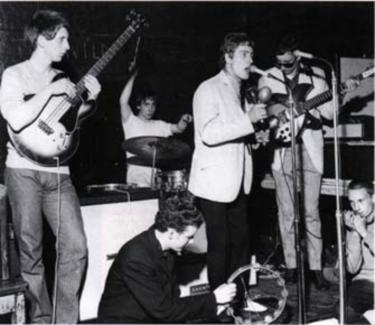Was the Who’s “My Generation” Banned by the BBC for Being Offensive to Stutterers?
Here is the latest in a series of examinations into urban legends about music and whether they are true or false. Click here to view an archive of the music urban legends featured so far.
MUSIC URBAN LEGEND: The BBC originally banned the playing of the Who’s “My Generation” because it was offensive…to stutterers!
It’s important to note that among the top British acts of 1964/1965, the Who and the Kinks stood out a bit from the Beatles and the Rolling Stones in terms of “rocking hard.”
In 1964 and 1965, the Beatles were still doing mostly middle-of-the road pop songs (amazing middle-of-the road pop songs, of course) and the Rolling Stones were still doing a mix of blues songs and pop songs.
Later on, both the Beatles and the Stones began to rock just as hard as the Who and the Kinks, but in 1964, the Who and the Kinks stood out in terms of how aggressive their sound was, which makes sense, as they were the front of the line of young musicians who were reacting TO the Beatles’ sound (and popularity).
So when their album The Who Sings My Generation came out in 1965, it had a much harder sound than was typically played on British radio at the time.

And most specifically, the lead track from the album, “My Generation” was just that, a song that seemed to be about the next generation of British rockers. It reeked with attitude, most prominently where the song teases the audience with the possibility of a different “F” word when it says “Why don’t you just f-f-f-f-fade away.”

Amusingly enough, the song WAS banned by the BBC from its playlists when the song was released. That’s not THAT surprising, but what IS surprising is the reasoning – the BBC felt that the song was offensive….to stutterers!
You see, throughout the song, singer Roger Daltrey, well, stutters. I mentioned one example above – “Why don’t you just f-f-f-f-f-fade away,” but there are a few more instances sprinkled throughout.
Eventually, after other pirate stations began playing the song, the BBC relented and began playing the track.
It ended up selling roughly 300,000 copies and made it to #2 on the UK charts – amazing results for a song that was initially banned by the BBC!
The legend is…
STATUS: True
Thanks to Joe McMichael’s The Who Concert File for the information.
Feel free (heck, I implore you!) to write in with your suggestions for future urban legends columns! My e-mail address is bcronin@legendsrevealed.com






Ah yes but being banned by the beeb is sure fire publicity and an almost guarentee of a number one.
See also Frankie Goes To Hollywood’s Relax.
Surprising – we usually tend to assume political correctness is more of a modern conceit, and that things being censored for patently ridiculous reasons is more of a current thing (with people willing to sue over almost any minor perceived insult).
But here’s proof that there’s “nothing new under the sun”, as it were. It’s pretty clear to anyone with even half a brain who’s even remotely paying attention that the song really isn’t mocking or insulting stutterers, and certainly shouldn’t be offensive to any even-minded individual (at least not for that reason, anyway). Yet the Beeb banned it anyway, and on their own and not in response to any sort of outrage or threat of boycott or the like.